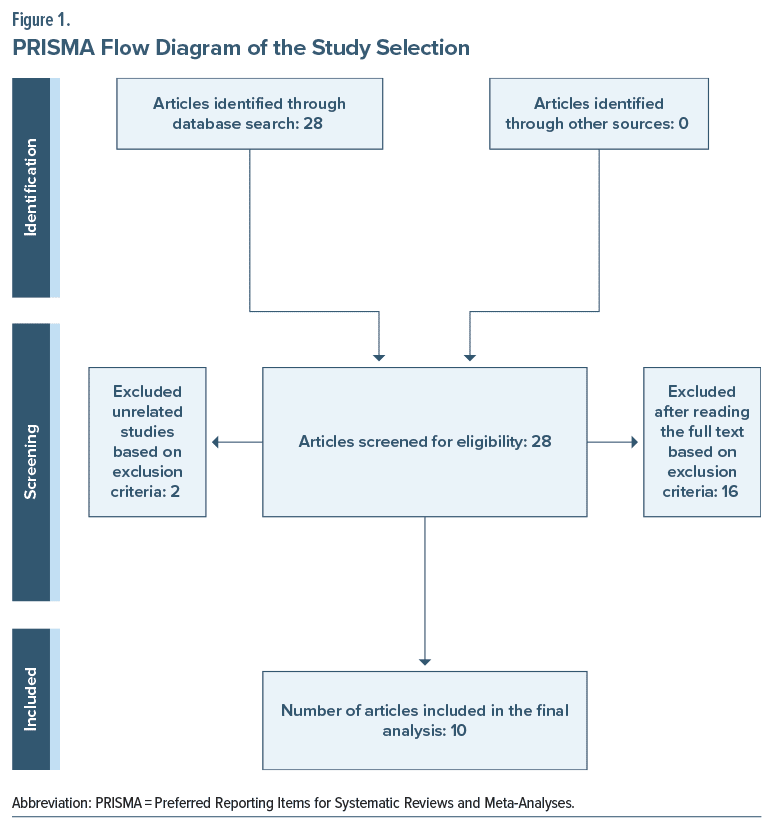Abstract
Objective: To explore quality indicators in community mental health services.
Evidence Review: The PubMed and Scopus electronic databases were searched using the keywords (“quality indicators” OR “quality measurement” OR “quality standards”) AND (“community mental health” OR “community mental health services” OR “community mental health care”). No date limits were imposed, and studies were restricted to those available in English. A total of 10 studies were reviewed, comprising original research and review articles. Inclusion criteria encompassed studies investigating quality of community mental health services irrespective of study design or intervention type.
Findings: Findings revealed patient-level quality indicators (access to health care services, continuity of care, regular contact with health care providers, coordination of care, continuity of care, communication among staff, and the need for regular staff), staff-level quality indicators (minimal staff turnover, implementation of clinical and treatment guidelines, staff behavior, and regular training of staff), community-level quality indicators (comprehensiveness of support services, the level of community’s understanding of mental health, involvement of local communities, and employment rates of people with mental health disorders), and structural-level quality indicators (physical facilities and their conditions, the availability of specialized treatments, and having a diverse range of services).
Conclusions and Relevance: The findings highlight the importance of assessing and improving the quality of mental health services. A thorough evaluation requires a multilevel strategy that considers various indicators, including community, staff, patient, and structural factors. By addressing these diverse variables, mental health services can enhance the quality of care provided, ultimately improving the mental health outcomes of the populations they serve.
Prim Care Companion CNS Disord 2025;27(2):24r03859
Author affiliations are listed at the end of this article.
Mental health is an important component of overall health and well-being, a fundamental human right, and extremely significant to everyone, everywhere. Stigma related to mental illness is so high that people living with mental illness are often excluded from community life, and their basic human rights such as right to education, employment, and housing are often violated. One important step in promoting mental health care and protecting the rights of people living with mental illness has been the transition of mental health care from large psychiatric institutions to community-based mental health services. This approach is widely accepted and has shown better health outcomes for people living with mental illness.1
Although community mental health services play a crucial role in providing accessible and effective mental health care within community health settings and a significant role in promoting, protecting, and realizing fundamental rights of people living with mental illness, it is important to monitor such services to assess their effectiveness in objective terms. Quality assessment based on objective indicators is essential for auditing mental health care services to ensure good quality mental health care.2 The domains of mental health quality include accessibility, acceptability, treatment quality, continuity of care, safety, management of vulnerable populations, and multidisciplinary care.3 Apart from assessing health care quality, such measures will also alert users regarding areas that need improvement in processes and outcomes.4 Quality indicators will facilitate the evaluation of quality and effectiveness, drive improvements, and ultimately enhance patient outcomes.
Despite the critical importance of quality assessment in community mental health care, there are limited explorations and understandings regarding the domains that need regular monitoring while evaluating community mental health care services, which are significantly different from hospital- or clinic-based services. The involvement of nonmedical professionals such as volunteers in the delivery of certain mental health care services, the involvement of the community at large in resolving various background stressors faced by people living with mental illness such as housing and unemployment, and the need for awareness activities and advocacy demand that quality indicators should be specially tailored for community mental health care services.5,6 The aim of this scoping review is to systematically explore and synthesize published literature on quality indicators within community mental health services. This review also identified areas that require more research, which will direct future investigations and improve practice and policy. Ultimately, this review contributes to a deeper understanding of quality indicators in community mental health services, offering valuable insights for researchers, practitioners, and policymakers.
METHODS
This article provides a scoping overview of the literature on quality indicators in community mental health services. The Preferred Reporting Items for Systematic Reviews and Meta-Analyses for Scoping Reviews guidelines were used for a systematic evaluation that ensures transparency, iteration, and full reporting.7
Literature Search
A comprehensive literature search was conducted using the PubMed and Scopus electronic databases. The search terms used were (“quality indicators” OR “quality measurement” OR “quality standards”) AND (“community mental health” OR “community mental health services” OR “community mental health care”). No date limits were imposed, and studies were restricted to those available in English. Reports and documents from gray literature were included in the search.
Data Extraction and Quality Assessment
A total of 28 references were identified. Articles were evaluated for relevance, appropriateness, and clarity, focusing on quality indicators utilized to explore the quality of community mental health care services. Data were extracted independently by 2 reviewers (V.M. and M.V.), with discrepancies resolved through discussion. Ten articles were included in the final analysis (Figure 1).
RESULTS
Ten studies8–17 related to quality indicators in community mental health services were summarized, and 4 themes emerged: patient-level quality indicators, staff-level quality indicators, community-level quality indicators, and structural-level quality indicators. By examining these indicators across different levels, stakeholders can obtain a comprehensive understanding of the strengths and areas for improvement within community mental health services.
Patient-Level Quality Indicators
Patient-level quality indicators are critical for assessing the effectiveness and quality of care provided to individuals with mental illness. One study8 identified access to health care services, continuity of care, and regular contact with health care providers as indicators of good quality health care from the perspective of people living with mental illness. Another study9 identified coordination of care, continuity of care, and communication among staff as indicators of good quality health care from the perspective of people living with mental illness. Additionally, that study9 also identified the need for regular staff for the continuity of staff performance and care, which directly affects health care quality. Patient experience and quality of life assessments provide a subjective yet focused perspective on evaluating care quality. These indicators help assess patients’ perceptions of their care and their overall satisfaction with the services received.10
Staff-Level Quality Indicators
Staff-level quality indicators in community mental health services are essential for evaluating and enhancing staff performance, satisfaction, and well-being, which directly impact the quality of care provided to patients. Studies identified minimal staff turnover as an important quality indicator in community mental health care.8,11 Minimal staff turnover in community mental health care services positively contributes to the continuity of care, ensuring that staff maintain and improve their skills through ongoing participation in educational or training programs, conferences, and other professional development opportunities. The implementation of clinical and treatment guidelines further enhances staff productivity and increases the likelihood of achieving favorable health outcomes, providing valuable insights into the effectiveness of care delivery by staff members.8,11
Another study12 identified staff behavior as an important quality indicator in community mental health care services. Community mental health care services employing staff who are trained in providing mental health care with respect and consideration regardless of a patient’s age, sex, religious or cultural beliefs, or diagnosis are reported as good quality services.12 Training of staff to understand mental health issues affecting individuals across all demographics and to be aware of patients’ concerns about stigmatization is identified as an important strategy to improve quality.12 Moreover, the unavailability of health care workers and inadequate health care delivery are major issues affecting community mental health services. Support from professionals, organizations, and government entities is crucial. Systematic development of community mental health services is essential across different geographic regions to address these challenges and improve care quality.13
Community-Level Quality Indicators
Community-level quality indicators play a critical role in enhancing the quality of care and overall health of individuals with mental health conditions. Both developed and developing nations face challenges in ensuring quality care. Community-based organizations work with the goal of improving quality and reducing unacceptable variations in health and social services. Studies identified comprehensiveness of support services at the community level as well as the level of the community’s understanding of mental health issues as important aspects influencing the quality of community mental health care.10 Based on these findings, outreach educational programs to increase awareness about mental health issues are recommended to improve the quality of mental health care services.10
Another study14 identified the significant role of social support in influencing the quality of community mental health services. Services utilizing local communities in delivering mental health care services and proactively considering community engagement while adopting and implementing mental health care services are found to be more effective in achieving positive outcomes. Moreover, effective community engagement can significantly reduce the burden on mental health services and improve outcomes for individuals receiving care.14 The employment rates of people with mental health disorders and the mitigation of financial burden for treating mental illness are social and economic indicators of health care service quality.15
Structural-Level Quality Indicators
Research also identified various structural-level quality indicators of community mental health care services. A study9 identified that the availability of essential and up-to-date equipment and the quality of service provided are the main factors that influence the quality of health care services. Consequently, the physical facilities and their conditions, as well as the availability of specialized treatment, are crucial quality indicators of health care services. This includes factors such as electronic records (diagnostic information) and the availability of specialized staff (eg, psychiatrists and social workers). Therefore, continuous professional development and training opportunities for staff along with adapting to new treatment modalities and best practices are essential strategies to maintain the quality of community mental health care services.16 Studies also identified that quality of community mental health care services depends on having a diverse range of services, including outpatient care, inpatient facilities, and community outreach programs, as well as adaptability to a broader audience, flexibility of treatment options, and measurability of impact.13,17
DISCUSSION
This scoping review describes the quality indicators of community mental health services, highlighting the significance of multiple levels of quality indicators, including patient-level, staff-level, community-level, and structural-level indicators, within the health care system.
The findings highlight a range of indicators that can be utilized while evaluating quality of community mental health services. Patient-level quality indicators are crucial for achieving patient satisfaction and enhancing treatment outcomes. Staff-level quality indicators underscore the significance of staff behavior and responsiveness in influencing patient behavior.
Community-level quality indicators emphasize the importance of service accessibility and the efficacy of outreach programs in reaching broader populations. Lastly, structural-level quality indicators illustrate the necessity for strong infrastructure and support systems, including staffing and medical data management.
The findings reveal that continued care, reliable access to health care services, and systematic or regular contact with health care providers are crucial. Effective communication of health services enhances the continuity of mental health care, coordination, and staff performance. However, research indicates that evaluating patient perceptions of care; assessing clinical outcomes such as changes in symptoms, functioning, or quality of life; and measuring engagement in care are also important metrics.18
Overall, our findings indicate that the implementation of mental health care guidelines enhances staff productivity and achieves favorable health outcomes, providing valuable insights into the effectiveness of care delivery by staff members to community mental health services. Identification of these indicators can lead to a more competent and motivated workforce, thereby improving the quality of community mental health care provided to patients. Research has highlighted that evaluating mental health care quality is crucial for the community mental health care system. This evaluation system can help modify clinical practices, ensure the quality of mental health care, and promote structured and organized multidisciplinary treatment.19,20
Community participation in mental health services is crucial for the effective delivery, achievement, and implementation of health services. The development of community mental health services is essential to address challenges and improve service quality. Similarly, another study21 identified that mental health programs are a vital component for delivering quality health services to the community. Mental health conditions are influenced by various factors, including social isolation, socioeconomic impacts, chronic unemployment, and the broader community and health systems. Stigma presents a significant challenge to delivering high-quality mental health care in communities. The sustainability of mental health services depends on both efficient community involvement and the availability of local resources.21
Our findings also emphasized that the conditions of health care facilities and the availability of specialized treatment are crucial for evaluating the quality of health services. Key factors include electronic records and the availability of health care professionals. A previous study22 highlighted deficiencies of the health care services, insufficient health care staff, and the unavailability of electronic medical record–keeping systems as important aspects that influence the quality of the services.
Quality indicators are essential in enhancing patient satisfaction by ensuring care that is timely, effective, and patient-centered. Research emphasizes that prioritizing indicators such as patient outcomes, communication, and accessibility enables health care professionals to identify areas requiring improvement. Notably, patient satisfaction with psychiatric services in India is considerably lower than in other countries. Factors contributing to this disparity include inadequate infrastructure, prolonged waiting times, overburdened staff, stigma surrounding psychiatric treatment, and perceived poor quality of care. These challenges highlight the need for systemic reforms to improve psychiatric service delivery and patient satisfaction.23–25
The limitations of this scoping review include the restriction of the literature search to PubMed and Scopus, which may have excluded relevant studies from other databases. Additionally, limiting the review to English language publications introduces language bias, potentially omitting valuable research conducted in other languages. These constraints may result in incomplete data representation, reduced generalizability of findings, and a narrower understanding about quality indicators in community mental health services in diverse cultural contexts. Future research should adopt a more inclusive approach by incorporating multiple databases and multilingual studies for broader insights.
CONCLUSION
In conclusion, the findings of this scoping review highlight the importance of assessing and improving the quality of mental health services. A thorough evaluation requires a multilevel strategy that considers various indicators, including community, staff, patient, and structural factors. By addressing these diverse variables, mental health services can enhance the quality of care provided, ultimately improving the mental health outcomes of the populations they serve.
Article Information
Published Online: April 8, 2025. https://doi.org/10.4088/PCC.24r03859
© 2025 Physicians Postgraduate Press, Inc.
Submitted: September 26, 2024; accepted December 13, 2024.
To Cite: Uvais NA, Mangalamchery V, Vaseel M. Quality indicators in community mental health services: a scoping review. Prim Care Companion CNS Disord 2025;27(2):24r03859.
Author Affiliations: Department of Psychiatry, Iqraa International Hospital and Research Centre, Calicut, Kerala, India (all authors).
Corresponding Author: N. A. Uvais, MBBS, DPM, Iqraa International Hospital and Research Centre, Malaparamba, Calicut, Kerala 673009, India ([email protected]).
Relevant Financial Relationships: None.
Funding/Support: None.
Clinical Points
- Ensuring access and continuity of care is an important quality indicator in community mental health services.
- Reducing staff turnover and providing regular training are vital for maintaining high-quality mental health care.
- Engaging communities in mental health initiatives can improve understanding and support for individuals with mental health disorders and improve quality of the service.
References (25)

- World Health Organization. World mental health report: transforming mental health for all [Internet]. World Health Organization; 2024. Accessed November 10, 2024. https://www.who.int/teams/mental-health-and-substance-use/worldmental-health-report.
- Sharp DJ. Quality indicators for mental health in primary care: how far have we got? Qual Saf Health Care. 2003;12(2):85–86. PubMed CrossRef
- Hermann RC, Mattke S, Somekh D, et al. Quality indicators for international benchmarking of mental health care. Int J Qual Health Care. 2006;18(suppl 1):31–38.
- Turpin RS, Darcy LA, Koss R, et al. A model to assess the usefulness of performance indicators. Int J Qual Health Care. 1996;8(4):321–329. PubMed CrossRef
- Garfield RL, Lave JR, Donohue JM. Health reform and the scope of benefits for mental health and substance use disorder services. Psychiatr Serv. 2010;61(11):1081–1086. PubMed CrossRef
- Laugharne R, Shankar R. Quality standards for community mental health teams. Psychiatr Bull. 2009;33(10):387–389.
- Tricco AC, Lillie E, Zarin W, et al. PRISMA extension for scoping reviews (PRISMA ScR): checklist and explanation. Ann Intern Med. 2018;169(7):467–473.
- Kronenberg C, Doran T, Goddard M, et al. Identifying primary care quality indicators for people with serious mental illness: a systematic review. Br J Gen Pract. 2017;67(661):e519–e530. PubMed CrossRef
- Hartveit M, Vanhaecht K, Thorsen O, et al. Quality indicators for the referral process from primary to specialised mental health care: an explorative study in accordance with the RAND appropriateness method. BMC Health Serv Res. 2017;17(1):4. PubMed CrossRef
- Shield T, Campbell S, Rogers A, et al. Quality indicators for primary care mental health services. Qual Saf Health Care. 2003;12(2):100–106.
- Schellings R, Essers BAB, Kessels AG, et al. The development of quality indicators in mental healthcare: a discrete choice experiment. BMC Psychiatry. 2012;12:103. PubMed CrossRef
- Howard PB, El-Mallakh P, Rayens MK, et al. Patient satisfaction and treatment outcomes as quality indicators for mental health services. Int Psychiatry. 2004;1(5):5–6. PubMed
- Lehmann I, Chisholm D, Hinkov H, et al. Development of quality indicators for mental healthcare in the Danube region. Psychiatr Danub. 2018;30(2):197–206. PubMed CrossRef
- Kutash K, Acri M, Pollock M, et al. Quality indicators for multidisciplinary team functioning in community-based children’s mental health services. Adm Policy Ment Health. 2014;41(1):55–68. PubMed CrossRef
- Fisher CE, Spaeth-Rublee B, Alan Pincus H, et al. Developing mental health-care quality indicators: toward a common framework. Int J Qual Health Care. 2013;25(1):75–80.
- Perlman CM, Hirdes JP, Barbaree H, et al. Development of mental health quality indicators (MHQIs) for inpatient psychiatry based on the interRAI mental health assessment. BMC Health Serv Res. 2013;13(1):15. PubMed CrossRef
- Serene Olin S, Kutash K, Pollock M, et al. Developing quality indicators for family support services in community team-based mental health care. Adm Policy Ment Health Ment Health Serv Res. 2014;41(1):7–20.
- Glover GR. Medical audit and mental health care. Psychiatr Bull. 1990;14(6):326–327.
- Bernardo M, De Dios C, Pérez V, et al. Quality indicators in the treatment of patients with depression bipolar disorder or schizophrenia: consensus study. Rev Psiquiatr Salud Ment (Engl Ed). 2018;11(2):66–75.
- Kessler RC, Berglund P, Demler O, et al. The epidemiology of major depressive disorder: results from the National Comorbidity Survey Replication (NCS-R). JAMA. 2003;289(23):3095–3105.
- Quinlan-Davidson M, Roberts KJ, Devakumar D, et al. Evaluating quality in adolescent mental health services: a systematic review. BMJ Open. 2021;11(5):e044929.
- Coelho VAA, da Gama CAP, Andrade LIE, et al. Community mental health care network: an evaluative approach in a Brazilian state. Int J Ment Health Syst. 2023;17(1):9.
- Woldekidan NA, Gebresillassie BM, Alem RH, et al. Patient satisfaction with psychiatric outpatient care at University of Gondar specialized hospital: a cross sectional survey. Psychiatry J. 2019;2019:5076750–5076757.
- Yimer S, Yohannis Z, Getinet W, et al. Satisfaction and associated factors of outpatient psychiatric service consumers in Ethiopia. Patient Prefer Adherence. 2016;10:1847–1852. PubMed CrossRef
- Ratner Y, Zendjidjian XY, Mendyk N, et al. Patients’ satisfaction with hospital health care: identifying indicators for people with severe mental disorder. Psychiatry Res. 2018;270:503–509. PubMed CrossRef
Enjoy this premium PDF as part of your membership benefits!






